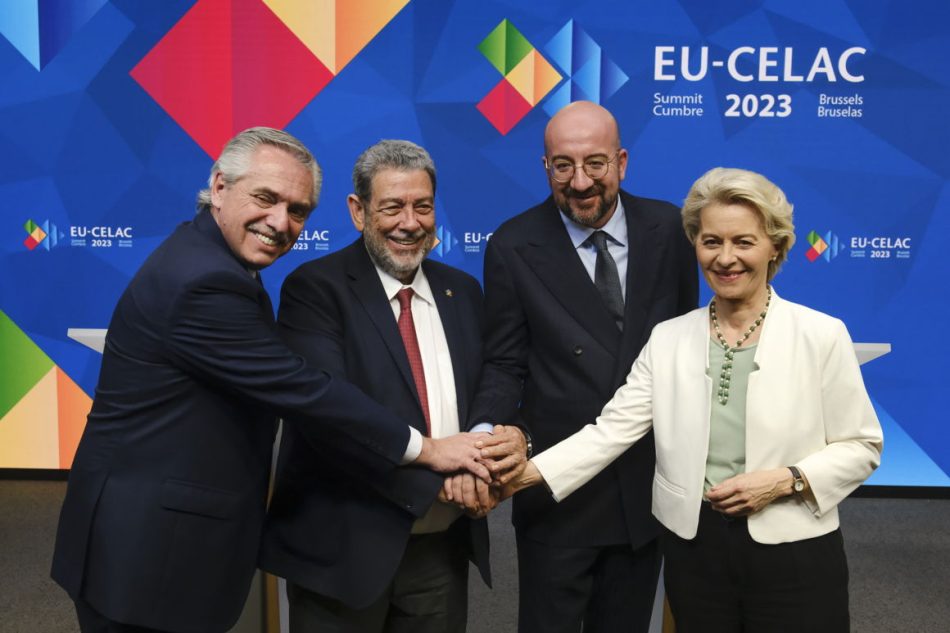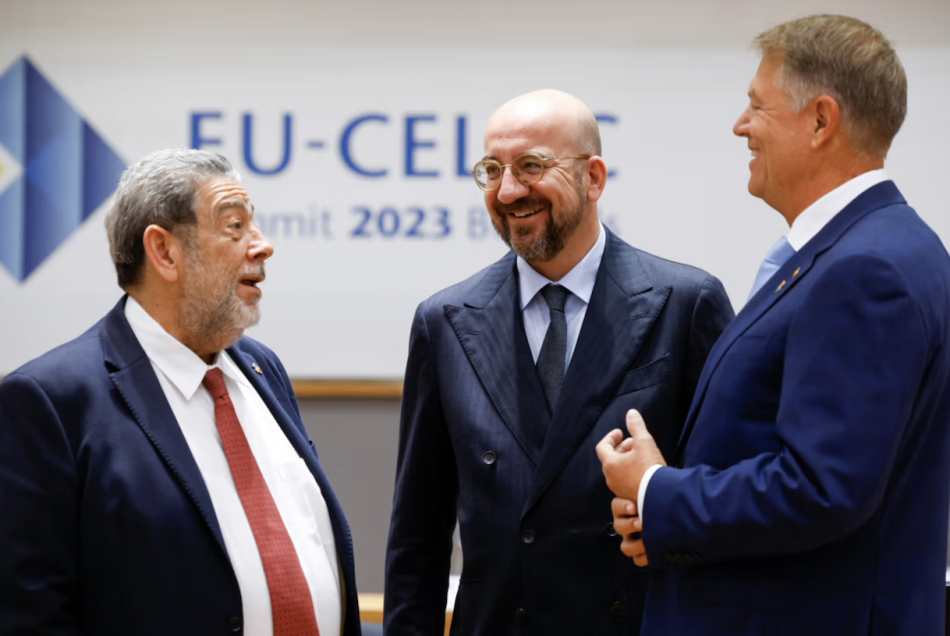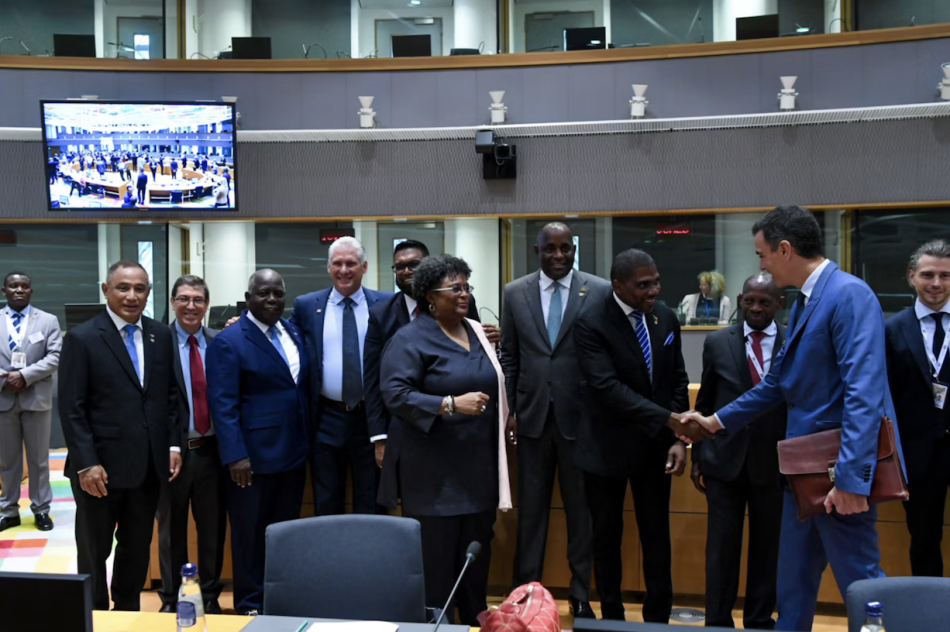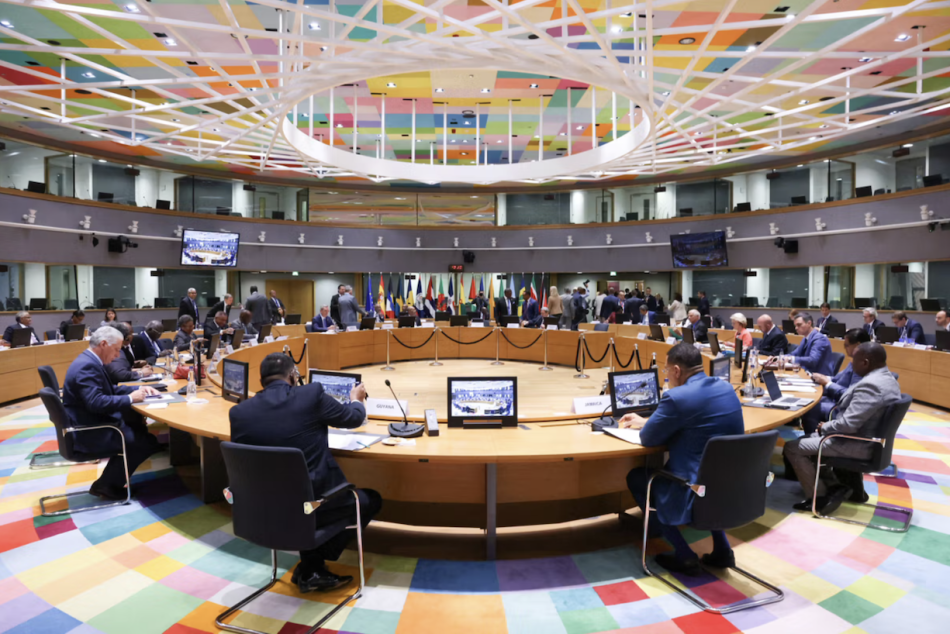EU-CELAC relaunches regular dialogue through a joint declaration at Third Summit in Brussels

By Claudia Mc Dowell Communications Specialist, Organisation of Eastern Caribbean States
Thursday, July 27, 2023 — There were tangible efforts made last week by both the European Union (EU) and Community of Latin American and Caribbean States (CELAC) to re-energise the relationship between the two regions after an eight-year EU-CELAC hiatus.
The Third Summit of the EU-CELAC was held on July 17 to 18, 2023 in Brussels, Belgium under the Spanish Presidency of the Council of Europe with President Pedro Sánchez as one of the main co-hosts. The Summit was co-chaired by Prime Minister Dr. the Honourable Ralph Gonsalves of Saint Vincent and the Grenadines. This was a meaningful event for the subregion as the country is one of the smallest member states of the Caribbean Community (CARICOM) and the CELAC 33-member political grouping. Saint Vincent and the Grenadines currently holds the Pro-Tempore Presidency of CELAC until January 2024. Also co-chairing was President of the European Council, Charles Michel.The Third EU-CELAC Summit brought together 60 countries representing more than one-third of the United Nations. Heads of state demonstrated their commitment to engage in valuable deliberations, and working towards the achievement of a better tomorrow, despite an exceedingly difficult political environment globally.


At the beginning of the Summit, Prime Minister Gonsalves alluded to the underlying global sentiments,
“We are assembling at a time of terrifying global turmoil and war and discord. A broken and unworkable financial architecture and the awesome contemporary challenges of an existential kind, particularly those relating to climate change, pandemics, poverty, food security, citizens’ security, inequality between and within nations, injustices galore.”
Prime Minister Gonsalves went on to note,
“We can devise and implement solutions for a better world for all of humanity, not only for a privileged minority in a few nations. But for us to succeed we must put an end to the wholly unacceptable notion that the strong with impunity do what they can, and the weak suffer ignominiously what they must.”


The EU-CELAC presented the Pro-Tempore Presidency with the outsized task of resolving regional disputes while working to strengthen the relationship between the two sides, in a world that continues to be characterized and shaped by elevated levels of geopolitical meandering and competing ideologies. The Presidency of CELAC competently led the way by managing several gutsy engagements leading up to and during the Summit, after an extended period of dormancy of the EU-CELAC grouping.
Director General of the Organisation of Eastern Caribbean States (OECS) highlighted,
“The EU-CELAC Summit under the Pro-Tempore Presidency of Prime Minister Gonsalves of St. Vincent & the Grenadines represented a watershed return to dialogue between the European Union, Latin America and the Caribbean. The leadership of St. Vincent & the Grenadines was instrumental in bringing a balanced and respectful tone to the contentious issues but also demonstrated the maturity of the small states of the Caribbean in continental diplomacy. In spite of the scepticism of many observers, the dialogue has inspired hope for continued frank discussions and the demonstration of concrete collaboration between the EU and the membership of CELAC.”


After several rounds of intense last-minute negotiations, both sides finally endorsed what was thought would have been an elusive Summit Declaration. This Summit Declaration was endorsed by all but one member state. It aims to build on the current momentum by relaunching the regular EU-CELAC high-level political dialogue through committed, coordinated action in the multilateral fora in areas of common interest and ongoing trade negotiations between the regions.
One of the major highlights of the Summit was the launch of a funding envelope of €45 billion called the Global Gateway Investment Agenda (GGIA). This envelope will support a list of projects and initiatives identified by member states and implemented by the private sector, with financial support from multilateral and national authorities. The GGIA envelope includes a €9.4 billion contribution from the Spanish government. GGIA will seek to make interventions in key sectors inter alia energy, transport, infrastructure, digital, education and research.
The Caribbean region was well represented at the Summit with nearly every head of state in attendance. Also present were high-level representatives from key regional institutions and the secretariats of integration organisations including the CARICOM Secretariat, Latin America Economic Association (SELA), the Association of Caribbean States (ACS), Central American Integration Association (SICA), Latin American Integration Association (ALADI), the Caribbean Development Bank (CDB), the Organisation of Eastern Caribbean States and Caribbean Export.
Caribbean leaders also took part in an extensive EU-CELAC programme of activities and separate bilateral and multilateral meetings with member states from both regions. Heads of state and officials engaged in constructive high-level dialogue with representatives from the private sector, civil society, and international and financial institutions over the two days.
A notable feature of this year’s Summit programme was the EU-Caribbean Leaders’ Meeting and a meeting held with the EU Commissioner of Home Affairs, Ylva Johansson, with heads of state of jurisdictions that operate a citizenship by investment (CBI) programme.
Among the major deliverables of the long-awaited Summit are the Summit Joint Declaration, EU-CELAC Roadmap for 2023-25, an EU-LAC Coordination Mechanism and the Global Gateway Investment Agenda (GGIA).





